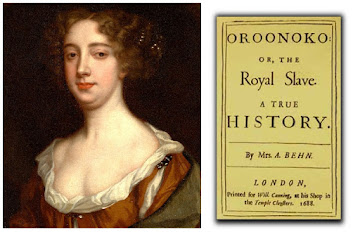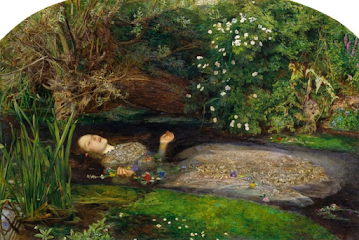Selfish Simpathy
Oroonoko: Or, The Royal Slave
I am not a historian, but I do like good stories, especially true stories about the history of our world and its inhabitants. I may have some of the facts mixed up and for that, I ask forgiveness but have added a link for you to journey to if you want to know the better of the truth, as far as it is recorded. I find that it is useful to know a bit of the history of the time a non-fictional story is written. It gives us a peek into the lens the author was seeing her world through, and why she might have felt certain ways, or engaged in certain experiences while acting as a high-class woman of her time period. And as the daughter of the colony’s governor, high-class she was.
When Aphra Behn published Oroonoko, the country of England was undergoing some major changes. During the time she was writing about her experience in Surinam, James II was losing power, Parliament was gaining it, and William of Orange was plotting a militaristic takeover. William III married his cousin, Mary Stuart, a Protestant. She was the daughter of James II who was a converted Catholic.
Charles II, James’s brother, held the crown and insisted that James continues to take the Protestant sacraments (even after he converted to Catholicism,) and his two daughters, Mary and Anne, were to be raised Protestant as well. In the online publication, Encyclopaedia Britannica, John P. Kenyon wrote an article in which he stated that James II was “more favorable to the Anglican church than was his Protestant brother.” Later, James had to prove to the Catholic church that he hadn’t switched to the church for political reasons and he stayed true to it even though it led to the end of his reign. James got the throne from Charles II, shaking England up a bit from having a Protestant King to a Catholic King. He was king over England, Scotland, and Ireland.Prince Oroonoko was a mighty general by the age of 17. After battle, it was common practice to gather his defeated armies and sell them off to slave ship captains. Later, when he became a slave, he found himself placed among the very men and women he had previously sold into slavery! Strangely enough, they did not rise up and kill him for this act, but they revered him as an honored King. Even his new owners treated him with honor, giving him the name Caesar. Behn had this to say about his arrival, “But if the King himself (God bless him) had come ashore, there could not have been greater expectations by all the whole plantation, … and he was received more like a governor than a slave … he endured no more of the slave but the name … receiving all visits that were made him, without stirring towards that part of the plantation where the Negroes were” (Norton 164). When he was introduced to the other slaves, “… they all came forth to behold him, and found he was that prince who had … sold most of ‘em to these parts … they all cast themselves at his feet, crying out in their language, ‘Live, O King! Long live, O King!’ and kissing his feet, paid him even divine homage” having a great celebration at his arrival. Later, when they fail an escape attempt led by Oroonoko, he chastises them equating them with dogs who love their master the more they are whipped. Even being a slave doesn’t change his mind about slavery, it just makes him even angrier that he must, for the time being, suffer to be so.
Behn adored the
slave prince, and admired not only his beauty but his position and his ability
to carry himself with great strength and pride above all others. In her
description she adds, “the most illustrious courts could not have produced a
braver man, both for greatness of courage and mind, a judgment more solid, a
wit more quick, and a conversation more sweet and diverting …” She describes
him as well educated in history, speaking French and English, and called him
graceful and civil, noting nothing barbarous about him. In his appearance, she
explained that “He was pretty tall, but of a shape the most exact that can be
fancied … more admirably turned from head to foot. His face was not of that
brown, rusty black … but a perfect ebony or polished jet. His eyes were the
most awful that could be seen, and very piercing, the white of ‘em being like
snow … His nose was rising and Roman, instead of African and flat; his mouth
the finest shaped that could be seen, far from those great turned lips which
are so natural to the rest of the Negroes …” (Norton 145). She seems quite
enamored with him, yet it is hard to pass the understanding that he is Only
lovely because he is more Roman than African. Even his skin color is not “typical”
and so therefore could not be equated with the common slave who she has little
want to pay any mind.
Behn later becomes obsessed with the love between Oroonoko and Imoinda, that is, Caesar and Clemene. When they learned that Clemene was pregnant, the plantation owners became so concerned about a mutiny that they employed Aphra Behn to befriend Caesar to play on his civility and manipulate his kindness. “This thought made him very uneasy, and his sullenness gave them some jealousies of him; so that I was obliged, by some persons who feared a mutiny … to discourse with Caesar, and to give him all the satisfaction I possibly could” (Norton 167). And later, “After this, I neither thought it convenient to trust him much out of our view” (Norton 168).
To further the argument that he was always a slave first, there were quotes such as, “… we
entertained him with, or rather he, us.” And to show that no other slave was
given as much attention, there was a maidservant who joined them in a journey
to visit the Indians near them, who is never given a name. She is only referred
to as “Woman.” Caesar then is used to kill a “Tiger,” be their bodyguard while
visiting the Indians, and as entertainment when he went to search out the
electric eel and to perform many other great feats.
A performance it is. Oroonoko is not doing these things for their pleasure, but because he is constantly lied to that the governor is coming and will most assuredly set him free. He performs to bring some sort of dignity to his life as a captured warrior. He performs to hopefully save the life of his most precious Imoinda and unborn child. He does what is needed to earn their good graces and to stay one step ahead of his enslavers. Until, when he, at last, must admit defeat, and he takes the life of his most beloved, and hands over his own in the very end. Being as against the way of slavery (as performed by his captors) that he was, it reinforced to Oroonoko that he would never serve the God they were trying to convert him to. He never said that he changed his mind about slavery, as aparantly his god allowed it too (so long as it was performed honorably.) That is, only those defeated in battle were allowed to be enslaved by their victors. Both gods in his eyes allowed it, but the people who followed the Christian God did not do it with honorable intentions. From the view of the a 21st Century Christian, it is difficult to see the attrocities done in the name of Jesus, that Jesus himself, would never condone.
 |
| This is from a different story artist, but the image was suiting. |
References
Kenyon, John P. EncyclopaediaBritannica.com.
3 April 2020. 22 September 2020.
<https://www.britannica.com/biography/James-II-king-of-England-Scotland-and-Ireland>.
All quotes come from Oroonoko: Or, The Royal
Slave, as found in the Norton Anthology, English Literature, 10th
edition. “The Restoration and the Eighteenth Century.
"Oroonoko: Or the Royal Slave - Literature Summary Review." Youtube, uploaded by Estoc Productions, November 14, 2018, https://www.youtube.com/watch?v=_9Eid3m80D0










An interesting story of which I am only peripherally familiar with. Slavery is an ancient institution with roots older than the bible. Te oldest known civilizations were known to employ slavery and the practice still remains today. Those wishing to bring an end to slavery are not new either. Slavery, in all of its forms, are an abomination to man and to God; but it is man who is the master of slavery.
ReplyDeleteAll across history there have been slave rebellions; men and women to not wish to be slaves but yearn to be free. That is the human condition. No free man or woman wants to be a slave. Writers do not honestly create characters happy in their slavery and no one, in their right mind, wishes to be a slave.
I wonder if that thought that no one wishes to be a slave can bleed over into how we feel about a job we dislike, or feel underappreciated or underpaid?
ReplyDeleteI like capitalism because we then have the freedom to leave that position, find a different job, start our own business, or go to college to better our situation.
The harsh point of this blog was to sort of equate Aphra Behn to a stake holder of a company, who sees the foreman treating his workers unjustly, recording the acts, but doing nothing about it. Then she publishes her works, has her readers say, "oh that's sad," and still, THEY do nothing to change it. Does that make her any better than the slave owner? I don't think so.